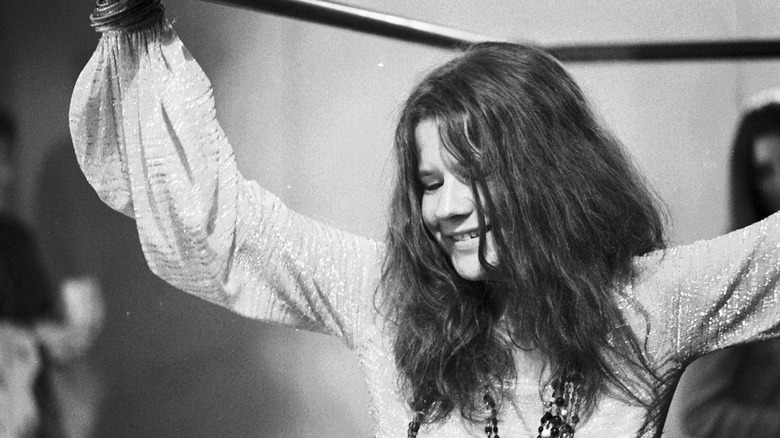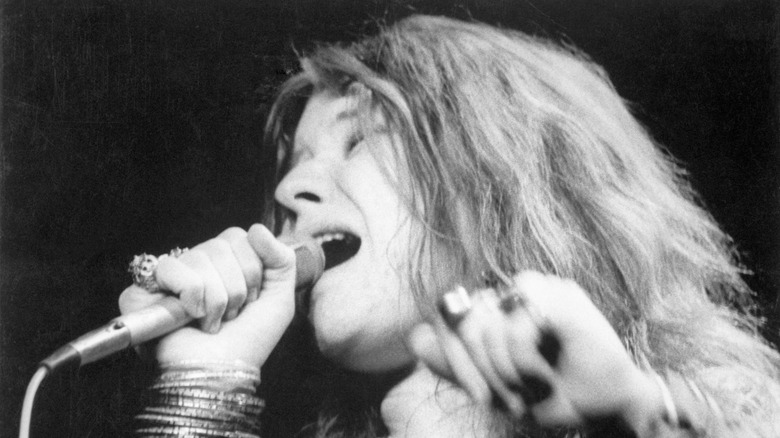The Tragic Truth About Janis Joplin's Final Interview
By the time Janis Joplin made her final televised interview on "The Dick Cavett Show" in early August 1970, it was her third appearance on the program in as many years. Each time, she had a different backing band. In 1968, it was Big Brother and the Holding Company. In 1969, she was with the Kozmic Blues Band, and by the summer of 1970, it was the Full Tilt Boogie Band, as she clarified to Cavett.
Joplin hailed from Port Arthur, Texas, and she moved to San Francisco in 1966, where she hooked up with Big Brother and the Holding Company. They put out two studio albums in '67 and '68, but it was Joplin's performance with the group at the 1967 Monterey Pop Festival that made waves. As she told Cavett in her 1969 interview, she didn't like being called a star, saying instead, "Call me a singer." Yet Joplin's powerful vocal performances were quickly catapulting her to new heights of fame and adoration.
In 1969, she released her debut solo album, "I Got Dem Ol' Kozmic Blues Again Mama!" That was the last album she'd live to see released. Her final studio album, "Pearl" came out in January 1971, but Joplin famously died in October 1970 at 27 years old of a heroin overdose. During those few years when Joplin was making a name for herself, she went on "The Dick Cavett Show" regularly. In her final interview with the host, she talked about some of the realities of fame and the "logistics" of putting together shows that worked well for audiences. The business side of things seemed to be a growing aggravation for Joplin, who was in it for the love of singing and expressing herself on stage.
Janis Joplin and Dick Cavett had a rapport
Dick Cavett was a writer when ABC offered him an opportunity to host his own show in 1968. He was a new face on TV at the same time Janis Joplin was being recognized as a force to be reckoned with on stage. "I'm so lucky that she liked coming on," he later said on an episode of "American Masters" posted on PBS Wisconsin. Cavett credited her for telling other rock stars of the day that "it's okay to do his show, he's not a dreary figure." Joplin and Cavett even spent time together after the show, one night going to dinner before going back to her home where they smoked a "cigarette of some sort." Seemingly, they liked each other, and even though Joplin seemed a little nervous on his show, she spoke honestly about how she felt about things.
Upon introducing Joplin in what would be her final interview on any show, Cavett called her "one of the most exciting singers there is." And when she joined him for the interview, he quipped, "Very nice to see you my little songbird." Cavett joked and put her at ease, and though he was a member of the media himself, he asked her if she had "any problems with interviews and that kind of stuff."
To that she answered, "Well, other than having to do them when you don't feel like it and other than having to talk to someone who doesn't seem to understand what you're saying, consequently, the words coming out a little stranger than you meant them. No." Though Joplin was enjoying performing and the adoration of her audiences, she never forgot being bullied and outcast by the teens in her hometown, an issue she spoke publicly about. Her feelings of being negatively judged by others may have been triggered by media reports that she didn't feel reflected her accurately.
Janis Joplin talked about how the industry was changing
Another thing that Dick Cavett asked Janis Joplin about was the changing hippie music scene in the wake of concerts that had turned violent, likely including the Rolling Stones' Altamont concert in December 1969 and Jimi Hendrix's June 1970 show (when the audience was tear gassed). Joplin was optimistic though and believed festivals were getting bigger because they were something people wanted to be part of. Still, she admitted it required a lot of work and organization behind the scenes to make things run smoothly and acknowledged that it was a work in progress. Sadly, she wouldn't live to see the evolution of music festivals or headline any of them. She didn't even get to enjoy the success of her final album, "Pearl," which saw three of its songs make it on the Billboard 100, with "Me and Bobby McGee" sitting at the No. 1 spot for two weeks in 1971.
Biographer Holly George-Warren, who wrote "Janis: Her Life and Music," told Beaumont Enterprise that Joplin experienced "deep-seated depression and a dark fatalism." Only 27 at the time of her fatal overdose and only about two months after her final interview on the Dick Cavett show, George-Warren says Joplin "had evolved as a musician, but not as a fully formed human being. She had not quite matured and made some bad choices. ... She was trying to stop drinking because alcohol is much worse than drugs for the voice. She ran into her drug dealer and decided to try heroin again and she died."
If you or anyone you know needs help with addiction issues, help is available. Visit the Substance Abuse and Mental Health Services Administration website or contact SAMHSA's National Helpline at 1-800-662-HELP (4357).
If you or someone you know needs help with mental health, please contact the Crisis Text Line by texting HOME to 741741, call the National Alliance on Mental Illness helpline at 1-800-950-NAMI (6264), or visit the National Institute of Mental Health website.

